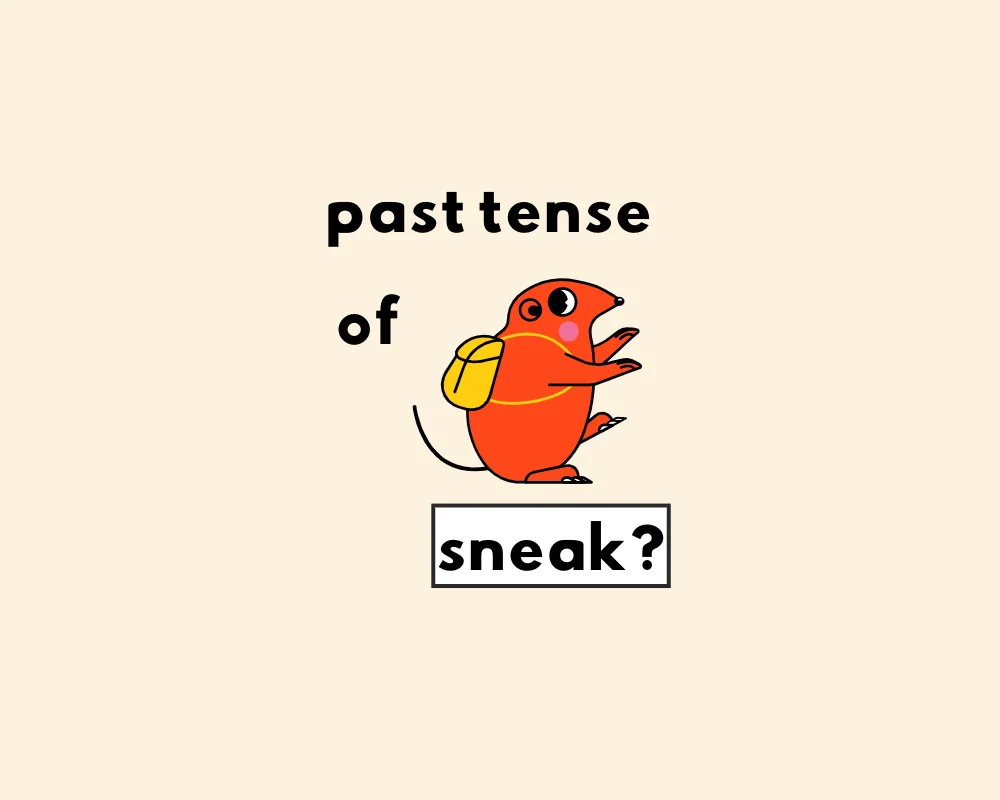
Which is correct: “sneaked” or “snuck”?
The past tense of sneak originally was sneaked. Now, snuck is commonly accepted as the past tense and past participle form of sneak.
I snuck out of the party.
I sneak out of meetings sometimes.
He had sneak into the room before we noticed.
I snuck out before my parents found out and grounded me.
Some still consider snuck a colloquialism—in other words, snuck is conversational or nonstandard. This does not make snuck incorrect—it just means that some are against its use. If you need a resource to arbitrate the debate on the past tense of ‘sneak’, you can refer to this blog.
What’s does sneak mean?
To sneak, as described by Collins Dictionary, describes “trying to avoid being seen or heard”. To sneak off somewhere means to leave in a way that doesn’t attract attention. ‘Sneaking something’ means taking, bringing, or doing something in a discreet way.
Forms of the verb sneak
| present | past | future | |
| simple | I sneak | I snuck/sneaked | I will sneak |
| continuous | I am sneaking | I was sneaking | I will be sneaking |
| perfect | I have snuck/sneaked | I had snuck/sneaked | I will have snuck/sneaked |
| perfect continuous | I have been sneaking | I had been sneaking | I will have been sneaking |
To sneak is in the present tense.
Sneaked/snuck are the simple past.
Sneaked/snuck are also the past participle form.
Is sneak a regular or irregular verb?
- Snuck is irregular and sneaked is regular.
Because snuck does not end in -ed in the past tense, it’s an irregular verb form. Sneaked is the regular verb form. Sneak can be both a regular and irregular verb, depending on the form you use.
Practice using the verb in different tenses with example sentences to memorize the correct forms.
Sentence examples of sneak in context
1. I managed to sneak in through the back door while she wasn’t looking.
3. They tried to sneak into the movie without paying.
4. Don’t sneak away and hide.
5. You told Mrs Cooper that it was me who tipped the paint over, didn’t you – you nasty little sneak!
The past tense/past participle snuck (in sentences)
1. I snuck another look at him as I sped along the Disney back-roads.
2. He snuck a few cookies out of the jar while his mother wasn’t looking.
3. She snuck up on me and made me scream
4. We waited a good fifteen minutes into the movie before I poked Joshua and the two of us snuck out.
5. Nick and Kelly snuck into the kitchen and made themselves a meal.
Origin of the word sneak
From etymology online on sneak (v.):
1550s (implied in sneakish), perhaps from some dialectal survival of Middle English sniken “to creep, crawl” (c. 1200), related to Old English snican “to sneak along, creep, crawl,” from Proto-Germanic *sneikanan, which is related to the root of snake (n.).
Worksheet
Test yourself before you flex your grammar. Take a quick quiz to test your knowledge of the tenses of the verb “sneak.”
1. Present Simple Tense: He _______ into the room quietly.
a) sneaks
b) sneaking
c) sneaked
2. Present Continuous Tense: Right now, they _______ past the security guard.
a) sneaks
b) are sneaking
c) sneaked
3. Past Simple Tense: Yesterday, she _______ into the house unnoticed.
a) sneaks
b) sneaking
c) sneaked
4. Past Continuous Tense: While no one was looking, he _______ around the corner.
a) sneaks
b) was sneaking
c) sneaked
5. Present Perfect Tense: They _______ into the cinema without tickets.
a) has sneaked
b) sneaks
c) have sneaked
6. Future Simple Tense: Tomorrow, she _______ out of the party early.
a) sneaks
b) sneaking
c) will sneak
7. Future Continuous Tense: By this time tomorrow, they _______ out of the building.
a) sneaks
b) will sneak
c) will be sneaking
8. Present Perfect Continuous Tense: He _______ around the neighbourhood for hours.
a) sneaks
b) has been sneaking
c) sneaked
Answers
- c) sneaked
- b) are sneaking
- c) sneaked
- b) was sneaking
- c) have sneaked
- c) will sneak
- c) will be sneaking
- b) has been sneaking
Learn more about verbs
- What are regular and irregular verbs?
- Transitive and intransitive verbs?
- What are verbs?
- Past tense of spread?
- What’re personal pronouns?
- What’s the difference between they’re, their, and there?
- Whose vs who’s?
Worksheet
What is the past tense of “sneak” that is considered grammatically correct, although some find it informal?
Which of these sentences uses the past tense of “sneak” correctly, even if some consider it nonstandard?
According to the blog post, which form of “sneak” is considered the regular past tense?
The blog post identifies “snuck” as what type of verb form?
The blog post suggests that using “snuck” might be considered:
He _______ out of the room quietly.
The cat _______ up on the mouse.
They _______ a glance at each other.
Last night, I _______ into the house late.
She had _______ away before we noticed.
Frequently Asked Questions
Is “snuck” or “sneaked” correct?
+
What tense is “I snuck”?
+
Is “sneak” a regular verb?
+
How is “snuck” used in sentences?
+
What does the verb “sneak” mean?
+
Yash, D. "What’s the Past Tense of Sneak? Sneaked or Snuck?." Grammarflex, Jun 6, 2025, https://www.grammarflex.com/whats-the-past-tense-of-sneak-sneaked-or-snuck/.











